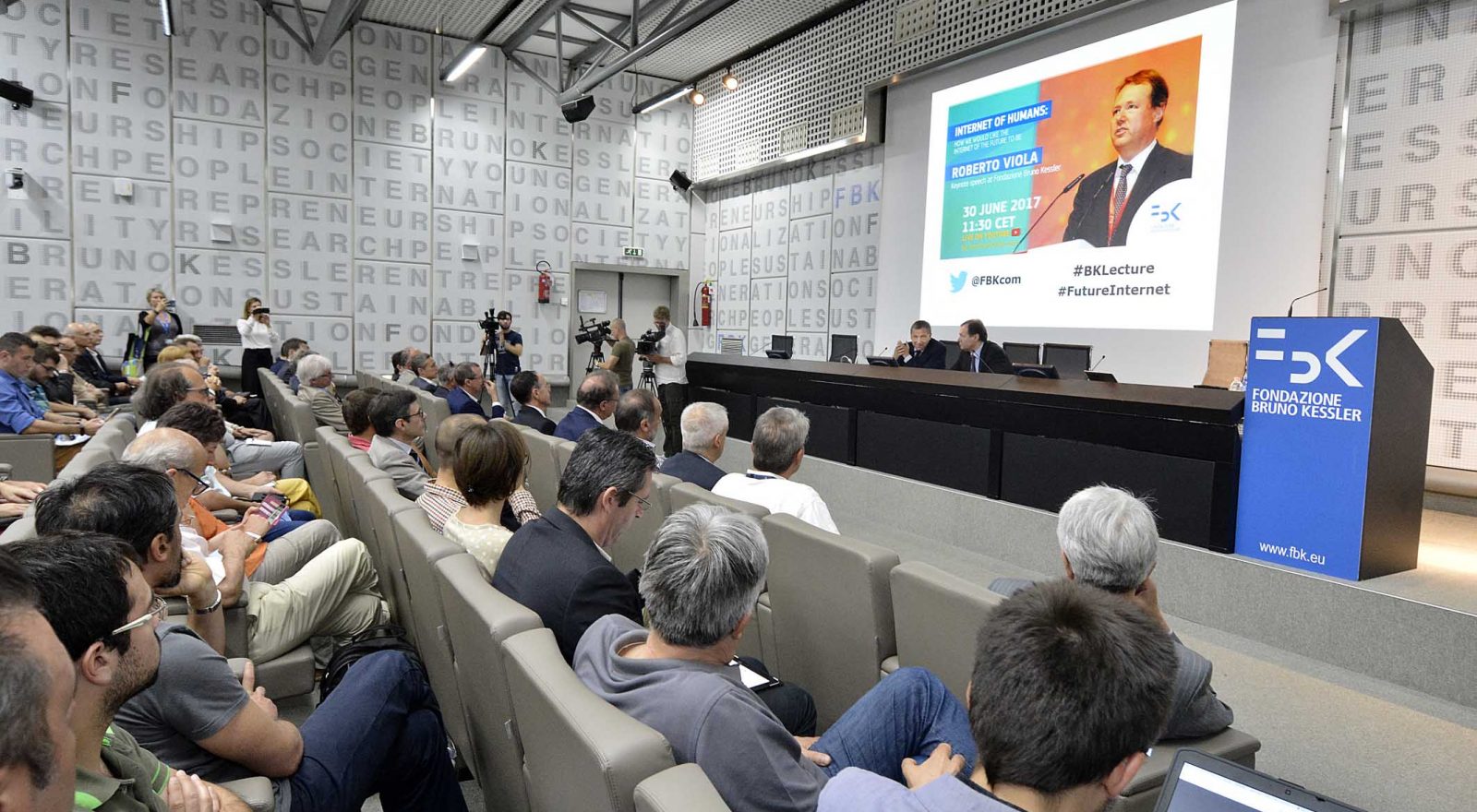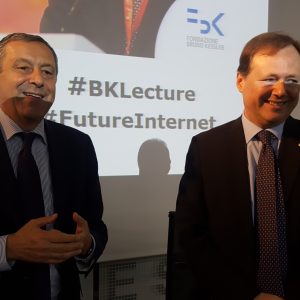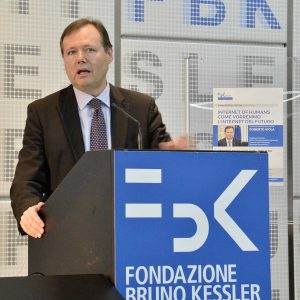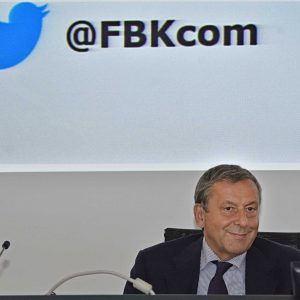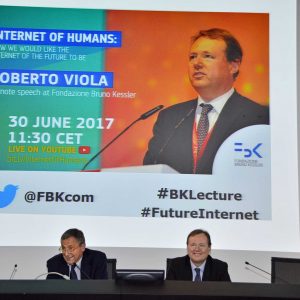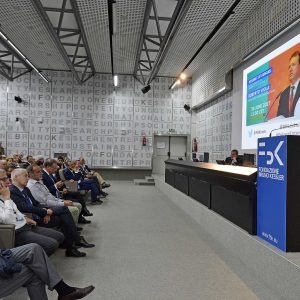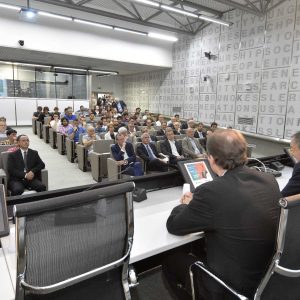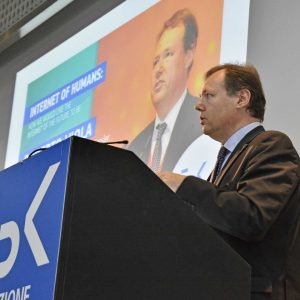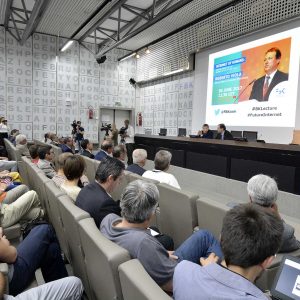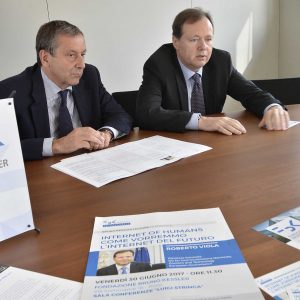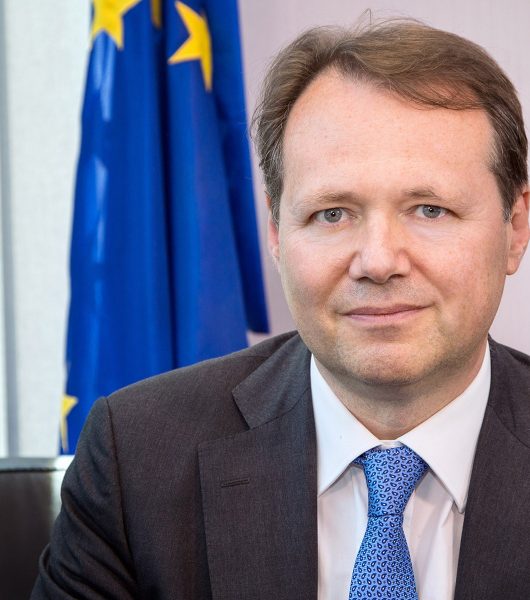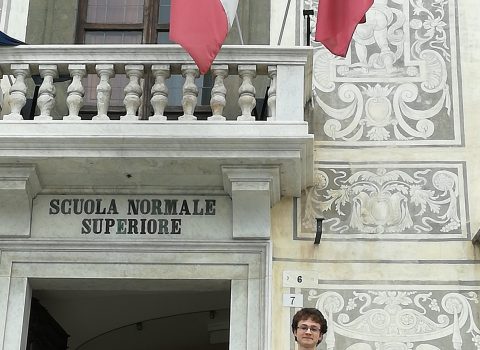How we would like the internet of the future to be. ROBERTO VIOLA AT THE BRUNO KESSLER LECTURE
What great opportunities does the Internet offer? What concerns does it raise? How can Europe contribute to the development of a more human being-centered Internet?
Roberto Viola, Director General of DG Communications Networks, Content and Technology of the European Commission, spoke about it this morning at Fondazione Bruno Kessler in Povo (TN) during the fifth Bruno Kessler Lecture.
In front of a room full of researchers, students, and citizens interested in listening to these important reflection of our time, Roberto Viola presented his vision as an expert and prominent observer of the Internet.
“The growing relevance of the Internet,” said Viola, “implies that it is no longer just an IT network but is rapidly shaping the economy and our daily lives.”
According to Viola, the Internet has become an important economic driver, which has made it possible to digitally transform most of the sectors of the economy, challenging business traditional models. At the same time, it is transforming our society: the way we live, the way we work, how we get informed and relate to each other. “These changes,” said Viola, “raise fundamental issues: does the Internet as we know it today meet the needs of citizens? What kind of Internet do we want to connect to ten years from now? What is the role of politics in shaping the evolution of the Internet? ”
According to the Director-General of the European Commission, DG Communication Network, Content and Technology, it is crucial to reflect on the key technologies and market trends that will lead the development of the Internet over the next few years, as well as to discuss how these developments can meet the needs of users more appropriately and on the other hand reflect the social and ethical values we enjoy in our societies.
“An example today” – Viola said – “is given by social media and networks that have dramatically changed the way people exchange opinions, get informed and take advantage of online creative content. They allow unprecedented levels of freedom of speech and media pluralism, while the perfect integration of intelligent, wearable objects and the use of virtually augmented reality will make the social networks, social media and platforms of the future the preferred channel For communication, exchange, business, learning and acquisition of knowledge. However, there are challenges that we need to address with vigour.
Information is knowledge
Recent advances in the field of Artificial Intelligence and the Internet of Things are equally essential to transform the increasing amounts os information into knowledge, to connect physical and virtual worlds and to integrate autonomy and intelligence in networks, robots, industrial platforms, and in connected devices.
About interactive technologies
Interactive technologies are producing a paradigm shift in the way we humans interact through the Internet. Voice recognition and augmented reality are two of the most notable examples of this evolution that are already pervasive in various sectors such as education, health, cars, culture and creativity. Similar advances are also taking place in the field of language technologies in support of multilingualism, one of the major advantages in terms of cultural diversity in Europe and, at the same time, one of the most important challenges for the creation of a truly inclusive Internet.
“Any reflection on a human-centered network” – concluded Roberto Viola – “must necessarily address universal needs such as privacy, security and identity management. In this respect technology and ethics can go together. Progress in the field of encryption and interoperability of public identity systems is moving in the right direction. ”
FBK President Francesco Profumo, in the introduction to Viola‘s Lectio, added another point of reflection: “Where has the Internet Age led us? It has essentially led us to a new approach to the life of the individual citizen and the world we used to know in many areas that have to do with the fundamental aspects of our everyday life. Two intances are particularly exemplary in this regard: health and jobs. Today we talk about precision medicine, namely about addressing health issues in an integrated way and not individually when a specific pathology occurs. This approach – dictated by the increasing use of ICT – allows to integrate data and requires being able to read them and knowing how to handle them organically, creating interactions between them. The evolution of online medical records is already underway and we are talking about an integrated ecosystem that monitors and relates not only health data, but the data of the person as a whole, collected in many ways, including by means thta we nowadays use day in and day out such as smartphones or pedometer bracelets. ”
“A second fundamental example,” continued FBK President, “is what is happening in the job market. How has it changed since the arrival of the Internet and the new technologies? In the fourth industrial revolution, “handy” technology innovation quickly modifies the way billions of people think and act, through their smartphone or tablet “prostheses”, with the consequent and equally rapid destruction of the analog business model. Destruction, this is precisely the metaphor for the disruptive effect of the cross-economic sectors digital transformation, which is pervasive and rapid in growth. “Innovate or die” is the motto of this new era. And research – together with schools and with the European, national and local institutions – plays a star role in governing this unprecedented change. ”
The Bruno Kessler Lecture
The Bruno Kessler Lecture is an annual event that hosts high-profile international scholars, invited to discuss major topical issues also for non-specialist audiences.
The first Lecture in spring 2013 brought to Trento Michael Spence, a professor at the New York University and recipient of the 2001 Nobel Prize in Economics; the second, Jared Diamond, the 2008 Pulitzer Prize recipient for Non-fiction with “Weapons, Steel and Diseases”; the third, English mathematician Marcus du Sautoy, Faraday Prize recipient. Last year, Heiner Bielefeldt, Special Rapporteur at the United Nations, held a lecture titled “The provocative potential of freedom of religion. The experience of a United Nations Special Rapporteur. ”
To watch again the 2017 Lecture follow this link: http://bit.do/lecture_Roberto_Viola_FBK_2017
– Read: “Internet of Humans” – Bruno Kessler Lecture by Roberto Viola, Director-General for Communications Networks, Content & Technology at the European Commission
– Photo service by Giovanni Cavulli
– Video images by VideoFrame (coming soon)
